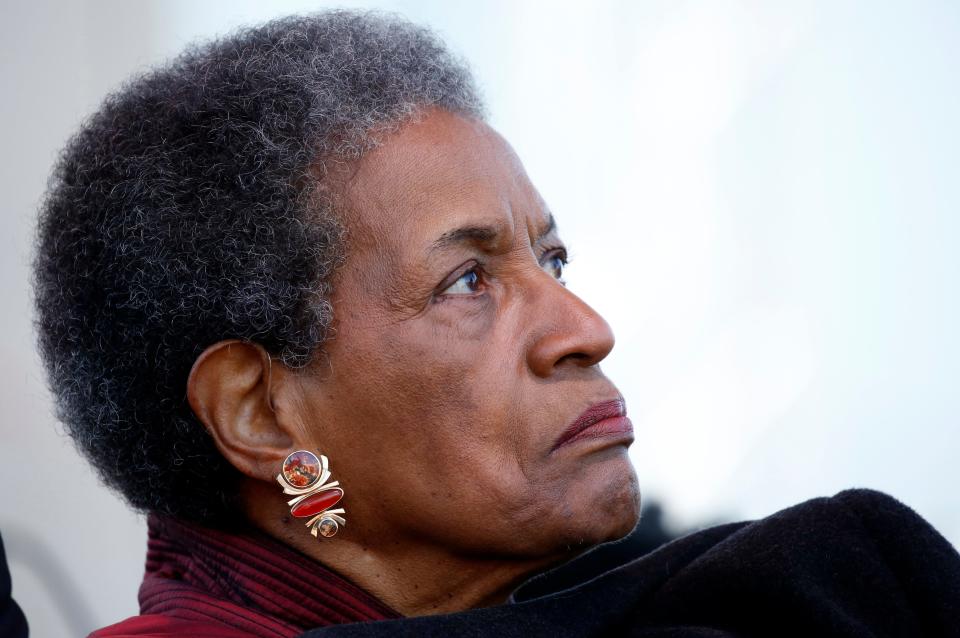'Medgar's wings must be clapping': With Mississippi flag vote, Myrlie Evers hopes America can come together
JACKSON, Miss. – Myrlie Evers began to weep when she heard the Mississippi Legislature voted to remove the Confederate battle emblem from the state flag.
“I can’t believe it. I am so emotional,” the widow of slain civil rights leader Medgar Evers said. “Medgar’s wings must be clapping.”
On Sunday, the Republican-controlled Mississippi House and Senate voted to replace the state flag a day after they voted to suspend the rules so lawmakers could bring up the new legislation.
If Gov. Tate Reeves signs the bill as expected, Mississippi would cease being the remaining state in the nation with the Confederate battle flag as a part of its state flag.

Under the legislation, a nine-person commission would be appointed to adopt a new design for the state flag. That design must include the phrase “In God We Trust,” but it can’t include the Confederate battle emblem.
If voters in November reject the new design, the commission would present a different option to the Legislature in 2021.
More: What we know, and what's next, for the bill to change the Mississippi state flag
'I never thought this would happen'
Myrlie Evers praised the courage of lawmakers.
“I never thought this would happen,” she said. “For the people who hold the palm
of Mississippi in their hands, for their wisdom and their strength, for them to vote the way they did is all but unbelievable to me, but I am ever so thankful for that vote.”
Mississippi has flown the current state flag since 1894 – four years after the state adopted a new constitution aimed at reasserting white supremacy and disenfranchising African Americans.
Other Southern states followed Mississippi’s lead, and soon African Americans across the South were barred from voting.
Myrlie Evers was born in 1933 in Vicksburg, Mississippi, the last major Confederate stronghold along the Mississippi River before Confederate soldiers surrendered to Union forces on July 4, 1863. When she was growing up, the state flag symbolized “slavery and second-class citizenship for those whose color was not white,” she said.
Evers is nearing 90, she said, “and I have carried the burden of my skin to what it represented to Caucasians and remember what my forefathers fought for: education and land ownership.”
Her husband, Medgar, “gave his life for his country,” she said. “He fought in Europe as a second-class soldier, fighting for a country that did not appreciate him. His life was taken June 12, 1963, because of those same freedoms.”
After serving in World War II, Medgar Evers became the NAACP’s first field secretary in Mississippi after he helped desegregate the University of Mississippi Law School, and his wife worked alongside him. During his time as an activist and organizer, one of his assignments was the investigation of Emmett Till's murder.
His widow now worries that the hard work of those in the civil rights movement has been forgotten.
“We’re moving into more turbulent times because of the leadership in this country,” she said. After watching the news, she said she sometimes finds herself in anger and despair.
“I feel my heart being ripped in shreds,” she said. “I hurt that deeply for what’s going on in America today.”
The deaths of George Floyd and other African Americans captured on video and shown on television have resurrected nightmares of the night her husband was shot by a white supremacist, Byron De La Beckwith, in the back in their driveway outside their Jackson home. When she heard the gunshot, she ran outside, saw her husband in a pool of blood and screamed.
Medgar Evers died an hour later at the hospital. Although De La Beckwith was arrested and tried on murder charges, two all-white juries did not reach a verdict. But Evers kept fighting for justice for her husband – which arrived about 30 years later in the early 1990s, when De La Beckwith was arrested again and convicted.
When she looks at the country today, she feels, that “America is at a crossroads,” just as it was six decades ago during the civil rights movement."
“I have children and I have grandchildren,” she said. “What kind of future will they have here, what kind of life will they have here in the land of their birth, the land that their grandfather fought in Europe to protect, America the beautiful? But America is no longer beautiful.”
She continues to pray for God’s help for the nation, she said. “I’m frightened, and I just hope people of goodwill will come together and vote for what they know is right and what is just and what is good for all of us, regardless of race, creed or color.”
She regards hatred as poison. “It poisons us as individuals,” she said.
“I don’t want that poison flowing through my veins anymore.” What Mississippi has done should inspire the nation, she said. “If Mississippi can make a move like this, I hope the rest of America can look at themselves and their states and see their signs of prejudice, hate and racism and perhaps be brave enough to remove them.”
More: Will the Black Lives Matter movement finally put an end to Confederate flags and statues?
Contributing: James Finn, Mississippi Center for Investigative Reporting
This article originally appeared on Mississippi Clarion Ledger: Mississippi flag change: Medgar Evers' widow responds to historic vote

